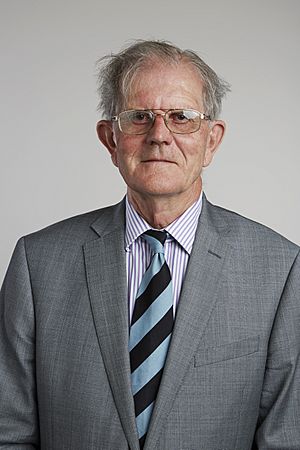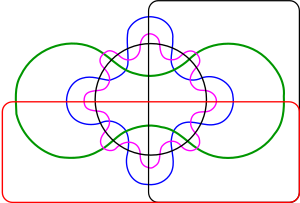A. W. F. Edwards facts for kids
Quick facts for kids
A. W. F. Edwards
|
|
|---|---|

Edwards at the Royal Society admissions day in 2015
|
|
| Born |
Anthony William Fairbank Edwards
4 October 1935 London, England
|
| Education | University of Cambridge |
| Known for | Mathematical genetics |
| Parent(s) |
|
| Relatives | John H. Edwards (brother) |
| Scientific career | |
| Fields | Statistics, genetics |
| Institutions |
|
| Academic advisors | Ronald Fisher |
| Doctoral students | Elizabeth A. Thompson |
Anthony William Fairbank Edwards, born in 1935, is a British scientist. He studies statistics (how to collect and analyze numbers), genetics (how traits are passed down), and how living things change over time (evolutionary biology). He is known as one of Britain's most important geneticists, especially for his work using math in genetics.
His father, Harold C. Edwards, was a surgeon, and his brother, John H. Edwards, was also a geneticist. People sometimes called him "Fisher's Edwards" because he was a student and friend of another famous scientist, Ronald Fisher. Anthony Edwards greatly admired Fisher's work and wrote many articles about it. In 1990, he suggested a special window be made to honor Fisher at Gonville & Caius College. When the window was removed in 2020, he strongly disagreed with the decision.
In the early 1960s, Edwards worked with Luigi Luca Cavalli-Sforza. Together, they created new ways to figure out how different species are related using genetic information.
Contents
Studying Science and Working

Anthony Edwards is a Life Fellow at Gonville and Caius College, Cambridge. He was also a Professor of Biometry at the University of Cambridge before he retired. Biometry is a field that uses statistics in biology. He has written several books and many scientific papers.
Working with Evolutionary Trees
With Luigi Luca Cavalli-Sforza, Edwards did important work on how to use numbers to build "evolutionary trees." These trees show how different living things are related and how they evolved from common ancestors. He also strongly supported Ronald Fisher's idea of "likelihood." This is a way to use statistics to decide which scientific ideas are most likely to be true.
Exploring History and Math
Edwards has also written a lot about the history of genetics and statistics. For example, he looked into whether the famous scientist Gregor Mendel's results were "too perfect" to be completely natural. He also writes about pure math topics, like Venn diagrams, which are drawings that show how different groups of things overlap.
Early Career and Key Books
After finishing his first research project, Edwards was invited to the University of Pavia in Italy by Luigi Luca Cavalli-Sforza. From 1961 to 1964, they started using early computers to develop statistical methods for building evolutionary trees from genetic data.
After that, Edwards spent a year at Stanford University. Then, he was a senior lecturer in Statistics at the University of Aberdeen for three years. Later, he spent two years at Gonville and Caius College, Cambridge, where he wrote his important book called Likelihood.
Later Work at Cambridge
Edwards spent the rest of his career at Cambridge, eventually becoming a Professor of Biometry. During this time, he published many works. These included books on Venn diagrams, mathematical genetics, and Pascal's triangle, which is a special number pattern. In 2003, Edwards wrote a paper where he disagreed with another scientist, Richard Lewontin. Lewontin had argued that the idea of "race" was not a good way to classify people. Edwards called this "Lewontin's Fallacy."
About His Life
Anthony Edwards's older brother, John H. Edwards (1928–2007), was also a geneticist. Both brothers were elected as Fellows of the Royal Society, which is a big honor for scientists. Their father, Harold C. Edwards, was a surgeon. In 2011, Anthony Edwards received the Telesio-Galilei Academy Award for his work in Biology.
Edwards also enjoys gliding, which is flying in a plane without an engine. He has written about gliding in a magazine called Sailplane and Gliding under the nickname "The Armchair Pilot."
Awards and Honors
In 2015, Anthony Edwards was elected a Fellow of the Royal Society (FRS). This is a very high honor for scientists in the United Kingdom.
His Books
- Edwards, A. W. F. 1972. Likelihood. This book explains his ideas about using "likelihood" in science.
- Edwards, A. W. F. 1977. Foundations of Mathematical Genetics. This book covers the basic math used in genetics.
- Edwards, A. W. F. 1987. Pascal's Arithmetical Triangle: The Story of a Mathematical Idea. This book tells the history of Pascal's triangle.
- David, H. A.; Edwards, A. W. F. 2001. Annotated Readings in the History of Statistics. This book shares important historical writings about statistics.
- Keynes, M.; Edwards, A. W. F.; Peel, R. eds. 2004. A Century of Mendelism in Human Genetics. This book looks at 100 years of Mendel's ideas in human genetics.
- Franklin, A.; Edwards, A. W. F.; Fairbanks, D. J.; Hartl, D. L.; Seidenfeld, T. 2008. Ending the Mendel-Fisher Controversy. This book discusses a debate between ideas from Mendel and Fisher.
 | Charles R. Drew |
 | Benjamin Banneker |
 | Jane C. Wright |
 | Roger Arliner Young |

